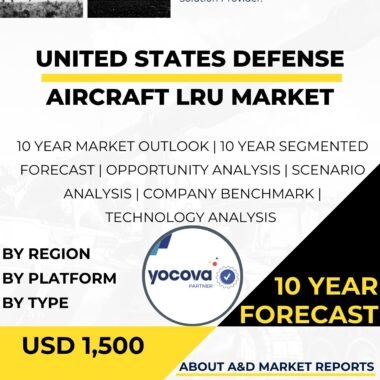Description
The Saudi Arabia defense aircraft Line Replaceable Unit (LRU) market is a critical aspect of the country’s defense industry, encompassing the procurement, maintenance, and support of LRUs for various military aircraft. LRUs are modular components that can be easily replaced at the organizational or intermediate levels of maintenance, reducing aircraft downtime and ensuring operational readiness.
Saudi Arabia’s strategic location in the Middle East, coupled with its growing defense budget, has made it a key player in the global defense market. The Kingdom has been investing heavily in modernizing its armed forces to enhance its capabilities and maintain a strong defense posture. As part of this effort, the Saudi government has been actively procuring and upgrading military aircraft, creating a substantial demand for LRUs.
The Saudi Arabia defense aircraft LRU market is dominated by major global aerospace and defense companies, both original equipment manufacturers (OEMs) and third-party suppliers. These companies supply a wide range of LRUs, including avionics, power systems, hydraulics, and communication equipment, among others. Additionally, the market also includes local companies and joint ventures, aimed at boosting domestic manufacturing capabilities and technology transfer.
One of the primary drivers of the Saudi LRU market is the continuous expansion and modernization of the Royal Saudi Air Force (RSAF). The RSAF operates a diverse fleet of combat aircraft, including fighters, bombers, and transport planes. With ongoing threats in the region and the need to maintain operational readiness, the RSAF focuses on upgrading existing aircraft and procuring new ones equipped with the latest technologies. These initiatives significantly contribute to the demand for LRUs.
Furthermore, Saudi Arabia’s engagement in regional conflicts and its participation in international military coalitions have underscored the importance of having a capable and reliable air force. As a result, the Kingdom has been actively investing in advanced aircraft and systems to bolster its defense capabilities, driving the demand for LRUs even further.
In recent years, there has been an increasing emphasis on localization and technology transfer in the Saudi defense industry. The Saudi government aims to enhance domestic manufacturing capabilities and reduce reliance on foreign suppliers. To achieve this, the government has encouraged partnerships between international defense companies and local entities. These partnerships often involve technology transfer and knowledge-sharing initiatives, further propelling the growth of the LRU market in the country.
Moreover, Saudi Arabia’s Vision 2030, an ambitious economic diversification plan, envisions the development of a robust domestic defense industry. As part of this vision, the country aims to foster indigenous research, development, and manufacturing of defense equipment, including LRUs. The local companies’ participation in the LRU market is expected to increase as the Vision 2030 goals progress, potentially leading to more joint ventures and technology collaborations.
However, challenges exist in the Saudi Arabia defense aircraft LRU market. The complexity of modern military aircraft and the rapidly evolving technological landscape necessitate continuous research and development efforts. Furthermore, geopolitical uncertainties, fluctuating oil prices, and global economic conditions can impact defense budgets, leading to fluctuations in procurement patterns.
In conclusion, the Saudi Arabia defense aircraft LRU market is a vital component of the country’s defense industry. With a focus on modernization, regional security, and economic diversification, Saudi Arabia presents substantial opportunities for global aerospace and defense companies to participate in this dynamic market. As the Kingdom continues its efforts to enhance its defense capabilities, the LRU market is expected to remain robust, with potential growth in domestic manufacturing and technology transfer initiatives.




